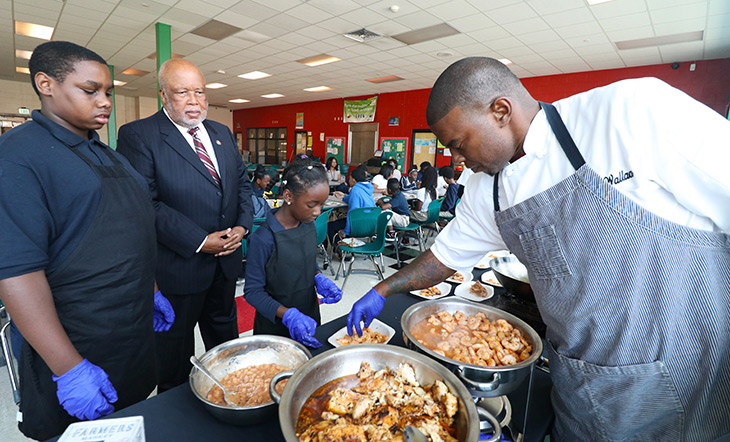Sustainable Seafood Comes to the Classroom
How we can transform elementary school students into local advocates
Nick WallaceOctober 02, 2019
-opt.jpg)
In our ongoing op-ed series, we’re featuring voices from the culinary community in an effort to allow them to weigh in and express their personal positions on the food-system issues they’re most passionate about.
Our latest piece comes from Nick Wallace, chef/owner of Nick Wallace Culinary in Jackson, Mississippi. Below, the Chefs Boot Camp for Policy and Change alum details a recent collaboration with the Environmental Defense Fund to introduce local elementary school students to the principles and delicious potential of sustainable seafood through a workshop, cooking demo, and fishing trip.
--
I’ve always viewed food as providing an opportunity to educate. That’s why I founded Creativity Kitchen, a program that teaches kids and school workers—primarily in low-income, predominantly minority districts—about how to work with and appreciate “slow,” locally produced whole food. Empowering people to make healthy choices for themselves is rewarding and critical for a healthy, just future.
So when I was approached by Environmental Defense Fund (EDF) to partner on Everyone’s Gulf, it was a natural fit. Through a diversity grant from EDF (an international organization which works to solve the world’s most pressing environmental challenges), Creativity Kitchen hosted a pilot program to educate students and staff at Blackburn Middle School in Jackson, Mississippi about nutrition, seafood sustainability, and grassroots advocacy.
Blackburn, my alma mater, is 98 percent African-American. The people that we brought this project to are generally not consulted on decisions about natural resources, much less sustainable seafood. I’ve seen this firsthand as the Mississippi co-chair for the Share the Gulf coalition, which advocates for responsible fishery management and fair access to Gulf of Mexico fish. I am also a James Beard Foundation Chefs Boot Camp for Policy and Change alum, and Everyone’s Gulf is one way I’m putting that training to use. By demonstrating simple culinary seafood preparations, explaining how fisheries management is critical to preserving wild-caught seafood supplies, and empowering students and staff to see themselves as entitled to have a say in how fish are managed, we aimed to plant the seeds for new advocates.
I wasn’t the only one looking to inform students about their right to access Gulf resources—our partners shared this message too. “A kid living in Jackson has just as much of a right to access seafood as anyone on the coast, and that means she also has a right to weigh in on policy,” said Elizabeth Silleck, senior manager for EDF’s Gulf Oceans team.

This recent event opened a door was opened for these Blackburn sixth graders to speak up. Mississippi Congressman Bennie Thompson attended the workshop and cooking demonstration. Commenting on the importance of resource sustainability, the Congressman drove home a key point underlying Everyone’s Gulf’s message: “big things come from small places.” He used me as an example: I grew up in small-town Edwards, Mississippi, but I've gained national recognition for my work. The message wasn’t lost on the students we worked with—one student even said she wanted to go to representative Thompson’s office with me to talk about how to protect the fish!
During the workshop, we learned about the importance of seafood traceability and supporting local fishermen from partner Gulf Wild™, heard about the state’s seafood heritage and economy from Mississippi Commercial Fisheries United, and played an interactive fishing game created by EDF that demonstrated the impacts of different types of management on fish populations and habitat. At the cooking demo, I showed the students how to properly fillet, debone, season, and cook fresh fillets of Gulf Wild™ red snapper and wild-caught Gulf shrimp. Many came back for seconds.
The students took to the message, as well—72 percent of those who took a pre- and post-test measuring knowledge of seafood sustainability and policy saw improved scores after the workshop.
But Everyone’s Gulf wasn’t over yet. Two days later, after a seafood lunch at the Blind Tiger sponsored by partner and Share the Gulf supporter Mississippi Hospitality and Restaurant Association, we all went fishing in the Gulf out of Biloxi. Captain Brandon of Silver Dollar Charters helped us land several huge redfish, a number of small mackerel, and an impressive crevalle jack. I learned this was the first time many of the kids had been out on a boat, and none had been out on the waters of the Gulf of Mexico before. I’m proud to have helped give the students that opportunity, and it was clear it made an impact. One sharp young man even asked on the way into port, “did we stay within the acceptable biological catch?” He was referring to a somewhat complex fishery management concept from the workshop—another indication that the material really sunk in. The kids were sent home with sizeable fillets, original recipes from me and, I hope, a newfound understanding of seafood sustainability and their rights and roles as stewards.
Everyone’s Gulf was designed as a pilot, and we hope to expand to other areas soon. Watch this video to learn more.
Learn more about the James Beard Foundation's sustainable seafood initiative, Smart Catch.
--
Nick Wallace is the executive/owner of Nick Wallace Culinary and founder of the non-profit Creativity Kitchen. Learn more about his work at nickwallaceculinary.com.




-57 web.jpg)


